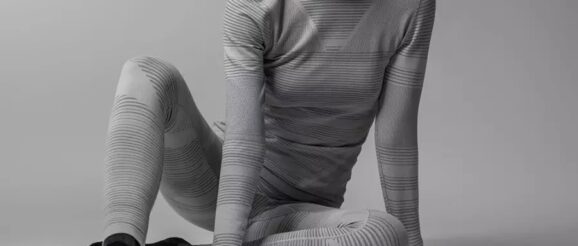ISPO recognition for Löffler innovation

Austrian sports and knitwear specialist Löffler will celebrate its 50th anniversary in 2023 and has just received an ISPO 2022 Innovation Award for Transtex Retr’x, its latest functional underwear.
The brand’s Trantex under garments proved an instant success when initially introduced in the 1970s, introducing the two-layer principle with structures combining hydrophobic polypropylene and cotton.
Until then, endurance athletes usually wore pure cotton underwear next to their skin, which became wet over time and cooled the body down. Transtex prevented this, since the polypropylene does not absorb moisture and instead wicks it to the outside, where it can evaporate to keep the skin dry.
This invention was groundbreaking for the sportswear industry and when Reinhold Messer and Peter Habeler climbed Mount Everest without oxygen equipment for the first time in 1978, Habeler wore a shirt made of Transtex.
Transtex Retr’x consists of recycled polypropylene from textile waste and Recot2 cotton fibre. Recot2 consists of 25% recycled cotton and 75% GOTS-certified organic cotton. It is neither dyed or bleached and is GRS-certified, as well being Standard 100 by Oeko-Tex approved. The processing of the cotton is particularly resource-friendly, especially in respect of water consumption.
Regional responsibility
Like all Löffler underwear products, Transtex Retr’x is 100% manufactured at the company’s headquarters in Ried im Innkreis, Austria. Production in Ried is STeP-certified, and all materials also come from STeP-certified suppliers in Europe.
Transtex Retr’x is also one of the first textile products in the outdoor industry to bear the Made In Green by Oeko-Tex seal.
“In our view, this means that we are currently offering the first underwear product that combines performance and sustainability at such a high level and at the same time shows that even a highly functional product with synthetic fibres can be sustainable,” says Löffler managing director Otto Leodolter. “At Löffler, social sustainability in the form of regional responsibility has always played an important role and while many competitors have outsourced their production to the Far East in recent decades, Löffler chose a different path.”
The company produces around 70% of the fabrics used in its collections in Ried, in addition to carrying out product development, design, cutting and and some sewing. In order to be able to handle the growth of recent years, it also works with other sewing companies exclusively in Europe and opened a new sewing building for its subsidiary in Bulgaria at the end of 2021.
“We are going our own way,” says Leodolter. “We want to form a counterbalance to Asian production and are convinced that we also need value creation here in Europe.”
